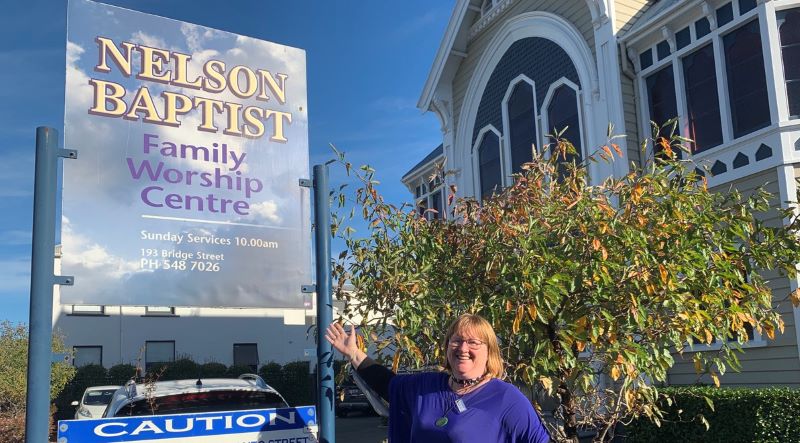Helen, you studied through Carey between 2011-2017, initially on the internship track and then the pastoral leadership track. What drew you to Carey?
Way back in 2010, I complained to God about burnout amongst Christians, which resulted in a call to full-time volunteering in my home church. I thought it might be useful to do one or two theology papers part-time along the way, and I foolishly attended a Carey Open Day and got hooked into doing an internship.
What were some of the highlights of your training?
Learning how to read scripture with integrity, finding out that Jesus does not have a problem with gifted, articulate women, meeting male lecturers and leaders who also did not have a problem with women pastors, finally completing the integrative seminar essay(!), and inserting 80s lyrics into every PL summer placement online reflection without Jonny Weir catching on.
How did your Carey journey equip you for gospel ministry?
Through the teaching, the pastoral care from lecturers, the rich community conversations with students and wider Carey staff, and the various ministry placements, my understanding of “gospel” and “gospel ministry” gained depth and breadth. It helped me frame my understanding of who and Whose I am, and it helped me clarify and better understand the kingdom call I’d received.
Where has your training taken you?
Two-thirds of the way through pastoral leadership training, I heard the Holy Spirit’s nudge towards interim and transition pastoring. Since finishing my pastoral leadership training, I have undertaken specialist interim and transition training. I’ve completed two interim pastorates in Northland and am currently serving as an intentional interim (transition) pastor in Nelson. I have also served on the Baptist Union Sexual Misconduct Response Team and the Baptist Union Assembly Council.
What do you love most about pastoral ministry?
I most love seeing people (and groups of people) being set free from shame, anxiety, and doubt. That moment when someone has a breakthrough—maybe they hear a word of truth that breaks off a lie that had been binding them, maybe they’ve heard or seen something that gives them enough confidence to confess or pray to God and know He will hear them. Sometimes God graciously uses me to speak the words that bring freedom, sometimes he just pokes me so I notice it happening through someone else. Either way, this is the thing I love most about pastoral ministry.
What do you love most about the church?
Mā te whititahi, ka whakatutuki ai ngā pūmanawa ā tāngata—weaving the realisation of potential together. What I love most about the church is its potential for good, and to do good, and to bring good to the world under the guidance and equipping of Jesus, by his Spirit for the Father’s glory.
In your final year on Carey’s PL programme, you wrote a theology of ministry. Do you remember that?! What theological convictions guide you, and hold you, in your ministry as you navigate the changes and challenges of Covid?
One of the statements I included was, “I believe that a church is not a church unless it has a transformative presence in its community.” It is something I still hold to be true. One of the consistent tasks I have been called to throughout this Covid era, is helping people think theologically and missionally in the midst of illness, anxiety, lockdowns, and restrictions. Helping them think past the populist sound bites and the inflammatory and often selfish rhetoric of Covid doom prophets. Reminding people of who and Whose we are, reminding them of our radical Saviour and His radical gospel—a gospel that must be good news for all peoples or it isn’t His good news. This “helping people reframe their interpretations of covid-ness through a gospel lens so they in their turn can help others do likewise” is part of my hope for the church in Aotearoa: that Christians can indeed have a transformative presence in their communities because we see the world differently, because we are increasingly seeing it the way Jesus does.
The theme for this issue of the newsletter is ‘connection.’ Covid has profoundly disrupted our normal patterns of gathering and connecting together. How do you think God might be doing something new in the church through this disruption?
Through lockdown, many Christians reconnected with rest on a Sunday morning. On the one day in the week they have any chance of a sleep in, lockdowns meant parents didn’t have to rush and wrangle children into Sunday clothes and Sunday smiles in time for a Sunday morning service. One of my hopes—it is a weak hope—is that “our” tie to Sunday morning worship gatherings is severely weakened post covid. Chinese and Chin State brothers and sisters meeting for worship in the afternoon have taught me that church is church regardless of when in the week God’s people gather. As Christians reconnect with rest, I do hope we are able to loosen the too rigid connection between Sunday mornings and church services, so more people are able to gather together around God’s word in worship.

Helen Brereton graduated from Carey Baptist College in 2017. Since then she has worked as an Interim Pastor and is currently at Nelson Baptist Church.

0 Comments